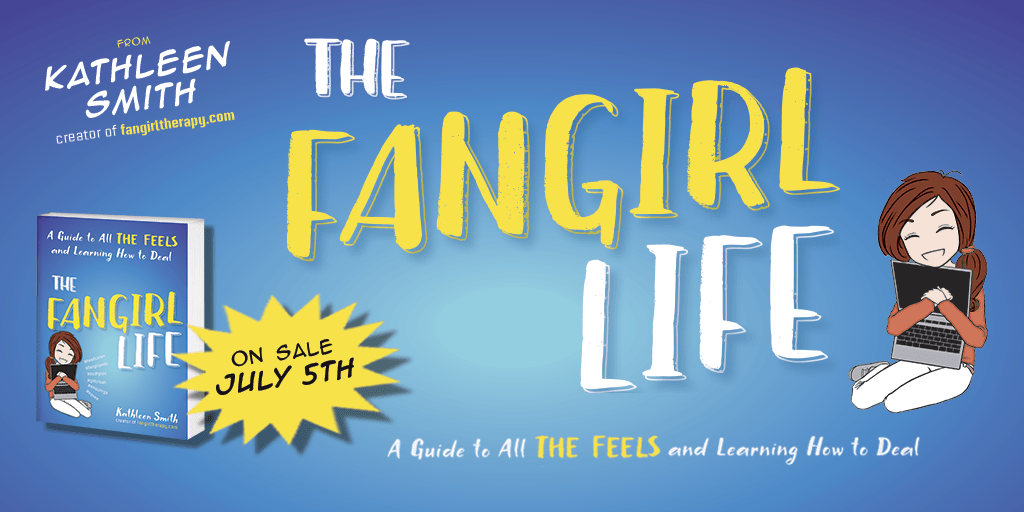Kathleen Smith is, by her own admission, an unabashed fangirl. In addition to being a licensed therapist and a mental health journalist, she runs a site called Fangirl Therapy, where she answers fandom-related questions and publishes pieces about her own fandom experiences.
She’s also a TMS contributor, having published a piece for us last year on Mental Health Awareness Week—and her new book, The Fangirl Life: A Guide to All the Feels and Learning How to Deal, was just published by Penguin Random House! TMS caught up with Smith via email to dive into a discussion on her new book and how we can relate our fandom life to our IRL experiences.
The Mary Sue: In The Fangirl Life, you talk about the ways in which we can take our fandom obsessions and apply them to other aspects of our lives. Is there a part of your fangirling you’ve been able to recently use in your career?
Kathleen Smith: Absolutely. There’s a certain level of vulnerability you develop as a fangirl. Your fangirl friends often see the silliest, most emotional, and most determined parts of your personality. And I think that engaging with that level of honest and vulnerability helps me as a writer and a counselor. Obviously I’m not going to be disclosing personal information to a therapy client, but I think writing more honestly about fangirling has toughened my skin. I’m less likely to fret more about what people think about me. People think all kinds of things about everyone! Especially on the Internet! But we can’t let that stop us from being our authentic selves in the world. It’s true for fangirling, and it’s true for your life offline.
TMS: What are some upsides of being a fangirl?
KS: I like to tell people to imagine how they feel when they’re watching their favorite team in the World Series or the Super Bowl. And then I explain to them that fangirls get to experience that level of emotion ON THE REGULAR. We can never live a perfect life, but we can certainly live an enthusiastic one. Fangirls don’t hang up their imaginations like many adults do. We don’t passively enjoy things. We are active participants in the media we love, which means we’re going to have a lot of fun and make a lot of friends along the way. What better life is there than that?
TMS: That being said, what are the most common misconceptions about fangirls?
KS: A lot of people imagine fangirls as having a one-track mind. But we can have successful careers and relationships and still cry about our OTP. We’re the ultimate multi-taskers. If anything, my fangirl interests expand my world. I recently became obsessed with Miss Fisher’s Murder Mysteries, and months later I’m reading histories of Australia and famous literature from the country. Fandom has also taught me a lot about representation in media and identity issues that seven years of grad school certainly never did! So I think the misconception that our eyes aren’t open is false. They most definitely are. Fangirls are going to make mistakes, and sometimes hurt people, and maybe even get a little too invested in an interest. But what part of that isn’t a part of being human? We’re not broken. We’re just continuing to learn and grow like anyone else.
TMS: You answer questions from fangirls as a part of your blog, fangirltherapy.com. What are some of the best ways we can cope with our overwhelming feels?
KS: Coping skills are as diverse as the things that cause our feels. I encourage people to play detective and carefully observe their thoughts and emotions. We have to pay attention to what gives us energy and peace and take notes. For me, it’s putting down the technology. I take a walk almost every evening. I leave my phone at home and squee over the cute neighborhood dogs and take some deep breaths. Other people find that keeping a journal or calling a friend can help. I’m also a big advocate of doing something nice for someone else. It’s amazing how much writing a thank you note or sending encouraging words to someone can calm my mind.
TMS: What are some of the aspects of fangirling that we can incorporate into our IRL, non-fandom environments?
KS: One of the main themes in The Fangirl Life is rooting for yourself the way you root for your favorite character. When we fangirl, we are so quick to forgive our favorites. We understand that there are going to be setbacks and mistakes along the way for them, because that’s a part of character development. So why can’t we do the same thing for ourselves? Seeing a crappy day as an opportunity for character development can help you not feel so caught up in the moment. It’s not an easy skill to learn, and it takes practice. But reframing a situation just at tiny bit can make a huge difference.
TMS: Which fictional character do you most strive to emulate (or avoid acting like) on a daily basis and why?
KS: Oh man. SO MANY. I have a whole crowd of characters in my head who try their best to nudge me towards self-improvement, whether I want to or not. I like to describe it as an independent study course where I glean as much wisdom as I can from one character and then move on to the next. Whether it’s Leslie Knope or Cristina Yang or Diane Lockhart, I try my best to pay attention. As far as avoiding, I think deep down we all have that Gaius Baltar quality of acting solely out of our own self-interest. So I have to constantly challenge myself to remember to consider someone else’s perspective. At the end of the day, if my focus is only on me and saving my own ass, then I haven’t really accomplished much.
TMS: What are your personal long-time fandoms?
KS: I lurked on the LOST message boards for a long time, but my first was definitely the Glee fandom. I hopped off after a few seasons, but I made a lot of lifelong friends. I was also obsessed with Battlestar Galactica, but I was mainly active in the “Mary McDonnell hair” contingent. My fandom experience usually revolves around actress worship rather than a show or story. It’s a long list of women who continue to both ruin and make my life.
TMS: Is there anything you’ve recently been fangirling out over, or a show that you can’t quite seem to get into (even though everyone else is)?
KS: Lately I’ve been catching up on a lot of shows that don’t have much of a fandom (that I know of at least). I watched Happy Valley and was absolutely floored by Sarah Lancashire’s performance. Same with The Americans. I also really loved Season 1 of The Expanse on SyFy, but few people on my social media seemed to be watching.
Dare I say it, but one phenomenon I haven’t really gotten into is Hamilton. Obviously Lin-Manuel Miranda is a genius, and the music is phenomenal, but I was a history major in college and have always been a John Adams girl. I feel like once you pick a founding father, you have to stay true to them. Sorry, Alexander!
TMS: If you could describe your book as one season of a TV show, which one would it be?
KS: Breaking Bad, Season 5. Kidding! I think it has a similar spirit as the first season of Glee. I’m thinking of that Rachel Berry quote, “Being part of something special makes you special.” But hopefully the analogy ends there! I wouldn’t want a second book to turn out like Season 2 of a Ryan Murphy show. If people take anything away from The Fangirl Life, I’d hope it’s that fangirling is about being an active participant in a story. We all bring our own quirky characteristics to fandom, and people will always have a lot of things to say about you, but we can’t hide from our authentic selves. Fandom doesn’t have to be a competition. When we surround ourselves with people with similar passions, we can do great things and create a lot of joy.
The Fangirl Life is available now from Penguin Random House.
—The Mary Sue has a strict comment policy that forbids, but is not limited to, personal insults toward anyone, hate speech, and trolling.—
Follow The Mary Sue on Twitter, Facebook, Tumblr, Pinterest, & Google+.










Published: Jul 6, 2016 01:09 pm